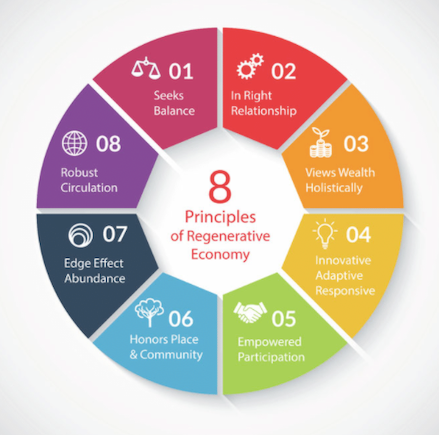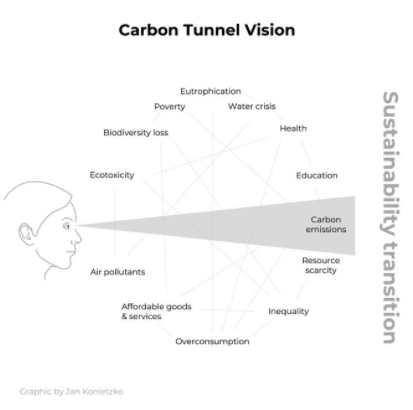
I’ve been talking a lot about DeFi, CeFi and HyFi, and someone said: what about ReFi? ReFi? What’s that? Well, ReFi is all about Regenerative Finance, a system to rebuild Earth.
Therefore, having shined a light on Gail Bradbrook’s thinking (she's co-founder of Extinction Rebellion) for the last months, I’m pleased to introduce you to a new contributor, Letty Prados.
Letty is a co-founder of ReGenLiving, one of whose aims it so to “safeguard the air we breathe, the water we drink, and the places we treasure”. I think that’s pretty laudable and Letty has written some fantastic insights into finance and regeneration or, if you prefer, ReFi, and she has kindly allowed me to share it here. This is Part One of two insights into how ReFi could change the world. Part Two will be shared at the beginning of November. Enjoy!
Exploring Regenerative Tokenomics.

Photo by Akil Mazumder from Pexels
Origins
In 2015, economist John Fullerton coined the term Regenerative Capitalism in a paper that describes eight principles that could underpin a new economic system — one that delivers shared prosperity on a thriving planet. He states:
The universal patterns and principles the cosmos uses to build stable, healthy, and sustainable systems throughout the real world can and must be used as a model for economic-system design.
These Eight Principles of a Regenerative Economy underlie systemic health and collectively represent the blueprint for a regenerative civilization:

8 Principles of a Regenerative Economy (Adapted from Capital Institute, 2020)
Likewise, transdisciplinary approaches, such as those brought forward by Sally J. Goerner et alia, have also focused on the science of Regenerative Economics which is based on decades of research into areas of complex adaptive systems, flow networks, and ecosystem and socio-economic dynamics.
This kind of economics, framed in an energy flow and networks perspective, requires a balance of efficiency and resilience be maintained within a particular “window of vitality”. They provide the logic behind the 10 principles of systemic, socio-economic health. In socio-economic systems, these network science concepts demonstrate how regenerative economics requires regular investment in human, social, natural, and physical capital.

10 principles for a regenerative economics based on natural law.
As stated in this 2019 paper, Regenerative Economics’ story of success mostly confirms what ecological economists already know while anchoring it in a more integrated and measurable empirical framework including robust circulation, balanced and integrated structures, investing in human and natural capacities, collaborative learning, and the dangers of concentration and extraction.
In the view of these complex system thinkers, promoting the health of the underlying human network is vastly more important than increasing the volume of economic output (GDP growth) per se. Innovation, entrepreneurship, and capacities are important, but they need to be linked by common-cause values, supported by commonwealth infrastructure, and nourished by cross-scale circulation of money, information, and resources. Large and small organizations both play important roles, and the goal is to maintain balance and integration.
Vision
Regenerative Finance, or ReFi, is based on this theory of regenerative economics. ReFi is the regenerative finance movement forming at the intersection of the third evolution of the internet (Web3). The acronym ReFi itself is reminiscent of its close connections to DeFi (decentralized finance). Within the ReFi space, a multitude of communities are emerging with the common objective of leveraging the blockchain (distributed ledger technology). The vision of these new proposals is to address sustainability challenges such as climate change, biodiversity loss, resource scarcity and the underpinning socio-economic and institutional structures that exacerbate these crises.
At its core, this approach implies a change of paradigm and the ability to articulate a complex systems solution. Regenerative economics incentivizes actions that increase systemic health, and disincentivizes actions that lead to systemic degradation. It applies nature’s principles of regeneration to socio-economic systems, supporting equitable wellbeing and thriving ecosystems.
As such, ReFi as a whole must act to prevent the pervasive “greenwashing” or carbon tunnel vision depicted below. For a systemic regenerative solution to be fully holistic, carbon emissions and markets need to be only one of many variables included.

Graphic by Jan Konietzko
Taking the above graphic as a pointer, ReFi aims to apply a 360º view to all the underlying symptoms in the diagram, with caring and nature-based systems thinking as the foundation. Since sustainability challenges stem from fragmented thinking and systems incentivizing degenerative behavior, holistic thinking and regenerative incentive systems need to replace them.
Mission
ReFi’s mission is therefore to systematize incentives to make regenerative places feasible. Addressing current crises profoundly means designing alternatives to our domination culture systems with regenerative ones that value caring and nature.
One of the core instruments in doing that is redesigning money itself in a way that writes a new story for what it actually means to be an integral human being living on a shared planet. A story that encapsulates the values of caring, mutuality and human flourishing.
Redesigning money requires understanding tokens (digital assets with a specific value) and tokenomics (token + economics), which makes visible and captures all the different forms and the eight manifestations of capital: social, material, financial, living, intellectual, experiential, spiritual and cultural.
In this undertaking, the foundations that gave rise to monetary accounting and money are redefined in a way that individual and collective actions coalesce in coherence towards a new scenario of local and global well-being, social fairness, renewal and justice within the earth.
This is crucial not only in redefining money within climate, harmony and justice values but also in activating the kind of regenerative economy that sees “places” as living organisms.
Places are each completely unique. They are unique in biology, ecology, and geology for instance. They are also unique in their cultural heritage. In regenerative practice, places are described as having a unique bio-cultural identity and potential. ReFi has the potential to deal with all aspects of restoring our economies into localised living entities. It uses place-based tokenomics that foster their thriving capacities within a collective thrivability pattern. It uses all eight manifestations of capital and eight principles of a regenerative economy — while every other level of the economic system design is restored and transformed according to global dynamics.
It is a bottom-up and local-to-global vision that honours the natural characteristics of each place and bioregional ecosystem. It is nested in evolutionary systems and bio-cultural uniqueness — ecology, biology, geology and culture — that is a place’s foundational essence, soul and identity.
Postcript:
Find out more about the collective impact initiative “Regen Living Ecosystem”, regenliving.eco, to be part of a global network of regenerators changing the world through place-based regenerative projects. Join our community on Discord here!
Attribution:
Letty originally published this insight on Medium in May
Chris M Skinner
Chris Skinner is best known as an independent commentator on the financial markets through his blog, TheFinanser.com, as author of the bestselling book Digital Bank, and Chair of the European networking forum the Financial Services Club. He has been voted one of the most influential people in banking by The Financial Brand (as well as one of the best blogs), a FinTech Titan (Next Bank), one of the Fintech Leaders you need to follow (City AM, Deluxe and Jax Finance), as well as one of the Top 40 most influential people in financial technology by the Wall Street Journal's Financial News. To learn more click here...

